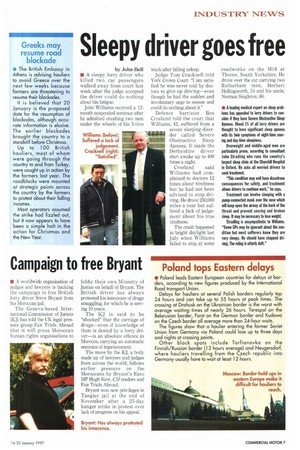Sleepy driver goes free
Page 9

If you've noticed an error in this article please click here to report it so we can fix it.
by John Bell
• A sleepy lorry driver who killed two car passengers walked away from court last week after the judge accepted the driver could do nothing about his fatigue.
John Williams received a 12month suspended sentence after he admitted crushing two men under the wheels of his Volvo truck after falling asleep.
Judge Tom Cracknell told York Crown Court: "I am satisfied he was never told by doctors to give up driving—even though he had the sudden and involuntary urge to snooze and could do nothing about it."
Defence barrister Ben Crosland told the court that Williams, 43, suffered from a
severe sleeping disorder called Severe Obstructive Sleep Apnoea. It made the Derbyshire driver start awake up to 400 times a night.
Crosland said Williams had complained to doctors 12 times about tiredness but he had not been advised to stop driving He drove 250,000 miles a year but suffered a lack of judgement about his true tiredness.
The crash happened in bright daylight last July when Williams failed to stop at some roadworks on the M18 at Thorne, South Yorkshire. He drove over the car carrying two Rotherham men, Herbert Hollingworth, 54 and his uncle, Norman Singleton, 86.
• A leading medical expert on sleep problems has appealed to lorry drivers to consider if they have Severe Obstructive Sleep
Apnoea. About of all lorry drivers are thought to have significant sleep apnoea with its twin symptoms of night-time snoring and day-time sleepiness.
Overweight and middle-aged men are particularly prone, according to consultant John Stradling who runs the country's largest sleep clinic at the Churchill Hospital in Oxford. He asks all worried drivers to seek treatment.
This condition may well have disastrous consequences for safety, and treatment allows drivers to continue work," he says.
Treatment can involve sleeping with a pump-connected mask over the nose which will keep open the airway at the back of the throat and prevent snoring and broken sleep. It may be necessary to lose weight.
Stradling is unsympathetic to Williams. Some GPs may be ignorant about the condition but most sufferers know they are very sleepy. He should have stopped driving. The ruling is utterly daft."












































































































